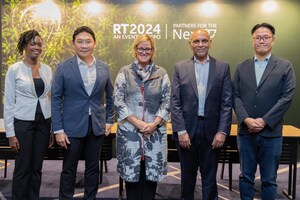The forum is tailored to engage downstream African palm oil supply chain actors including refineries, consumer goods manufacturers, retailers, traders, and distributors to explore and leverage key factors driving sustainability commitments on the continent, and ways in which to increase the uptake of RSPO Certified Sustainable Palm Oil (CSPO) in Africa.
Demand for sustainable palm oil in Africa is growing, albeit at a slower rate than other palm oil producing countries. Of the 3.4 million metric tonnes of palm oil produced in 2022, 11.7% were RSPO CSPO. An additional 15.4% is covered for yet-to-be certified units within RSPO Membership, under the timebound plan for certification.
"Downstream actors are important in the palm oil supply chain because they have the power to drive market demand. The forum is an opportunity to engage these supply chain actors on the continent to adopt sustainable practices within their supply chains through RSPO Certification, and increase the uptake of CSPO on the continent," said Elikplim Agbitor, RSPO Head of Africa. "Downstream actors have a Shared Responsibility to ensure that the products they sell are produced ethically and in compliance with environmental and social standards."
Founded in 2004, RSPO is the leading standard for sustainable palm oil production. The 2018 RSPO Principles and Criteria and the 2019 Independent Smallholder Standard cover environmental, social, and economic aspects, providing a comprehensive framework for sustainable practices. By sourcing RSPO CSPO, RSPO Members support initiatives that promote fair labour practices, respect for Indigenous rights, and community engagement in palm oil-producing regions.
South Africa is the largest consumer of CSPO on the continent, followed by Nigeria, Egypt, and Kenya, accounting for 17% of total CSPO consumption in Africa. With South Africa having the highest number of RSPO supply chain certified facilities by country, it is a critical hub for downstream suppliers. By committing to sourcing sustainable palm oil, these actors can not only drive demand for CSPO across the continent, but also encourage suppliers to adopt sustainable practices.
Participants at the forum will do a deep dive into the RSPO Supply Chain Certification Standard, RSPO Trademark use and license and audits among many other topics that will help downstream actors promote transparency and traceability in their supply chains.
About RSPO:
The Roundtable on Sustainable Palm Oil (RSPO) is a global partnership to make palm oil sustainable. Formed in 2004, the RSPO is a multi-stakeholder non-profit organisation that unites members from across the palm oil value chain, including oil palm producers, palm oil processors and traders, consumer goods manufacturers, retailers, banks and investors, environmental or nature conservation non-governmental organisations (NGOs), and social or developmental NGOs.
As a partnership for progress and positive impact, the RSPO facilitates global change to make the production and consumption of palm oil sustainable. To inspire change, we communicate the environmental and social benefits. To make progress, we catalyse collaboration. To provide assurance, we set the standards of certification.
The RSPO is registered as an international association in Zurich, Switzerland, with main offices in Malaysia and Indonesia, and offices in China, Colombia, Netherlands, United Kingdom and the United States.
Photo - https://mma.prnewswire.com/media/2388202/Africa_Forum.jpg







Share this article